Mobile, house call, and location based services
Chicago, IL and surrounding suburbs
How Canine Rehab
treats CCL/ACL Tears Holistically, Conservatively and post TPLO
Cranial Cruciate Disease/Cranial Cruciate Ligament Rupture
The cranial cruciate ligament (CCL) provides stability at the dog’s knee (also called stifle) joint. In humans it is called the anterior cruciate ligament (ACL). The meniscus is a disc that sits in between the femur (thigh bone) and tibia (shin bone). The meniscus is often compromised with cranial cruciate disease.
The CCL can be partially or completely torn. This predisposes the dog to arthritis since the joint surfaces will rub together with a compromised CCL.
In humans, trauma (like a skiing accident or other athletic injury) is the most common cause for an ACL injury. In dogs, it is much more likely that a CCL injury happens over time due to a variety of reasons (i.e. degeneration of the ligament, conformation, breed predisposition…). The ligament may be slowly injured over time until it reaches a point where you notice symptoms in your dog.
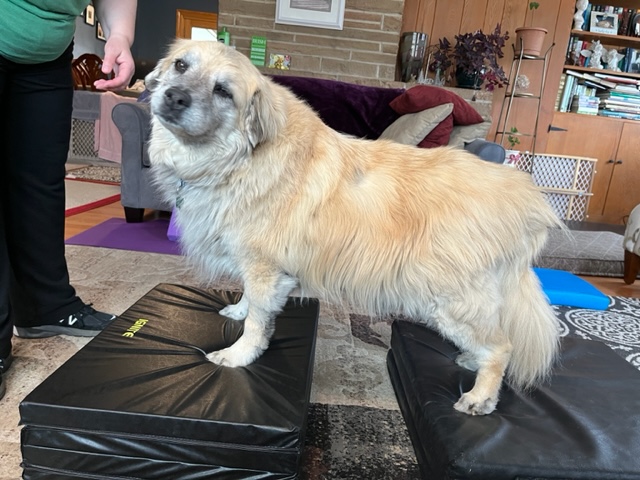
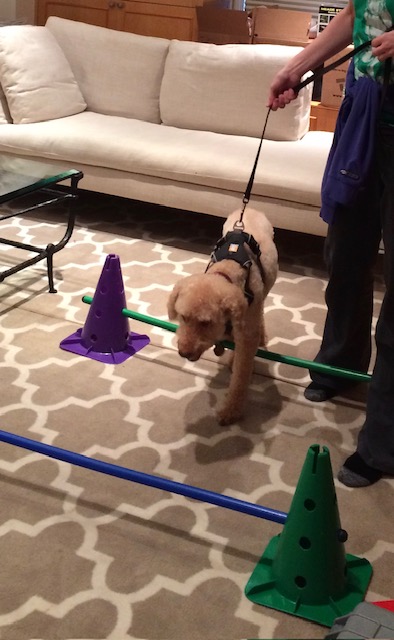
Symptoms of a CCL injury include:
Lameness (limping) of varying degrees depending on the degree of tear, or if one or both legs are affected. Limping may be slight with a partial tear and progress to non-weight bearing if a partial tear progresses to a full tear.
Muscle atrophy or imbalance (less muscle mass) on the side of injured CCL
Sitting with leg out to the side versus a square sit
Clicking sound (if meniscal injury involved)
Clunking sound (depending on degree of tear)
Swelling/thickening on inside of the leg
Less weight bearing to affected side (if only one side involved)
Sometimes, if one CCL has been injured, the other CCL may also become injured. This may be because CCL injuries in dogs are often influenced by the genetic makeup of the ligament itself. Partial tears will often progress to a full tear. If it takes enough time to progress from a partial to a full tear, arthritis may develop due to the chronic instability at the knee.
If your pet is displaying any of the above signs, you should consult with your veterinarian for an examination. Your vet may or may not refer you to a specialist depending on whether surgery may be felt to be beneficial or appropriate for your pet. Diagnosis of a CCL tear in your dog will be accomplished through observation, manual assessment (a positive cranial drawer or cranial tibial thrust test that will show increased motion at the joint), and x rays. Although x rays cannot show a tear in the ligament, they may point to clues such as increased effusion (swelling) and possible arthritis in the joint. These x-ray findings in conjunction with the observational and manual findings may lead your veterinarian to a diagnosis of CCL injury. While CCL injury is one of the most common reasons for persistent lameness in your dog, your veterinarian will rule out other possible causes for the presenting symptoms before reaching a final diagnosis of CCL rupture.
With your veterinary team you will determine if surgery or conservative treatment is the best option for your pet given individual factors such as the degree of tear, presence or absence of meniscal injury, and age and health of your pet.
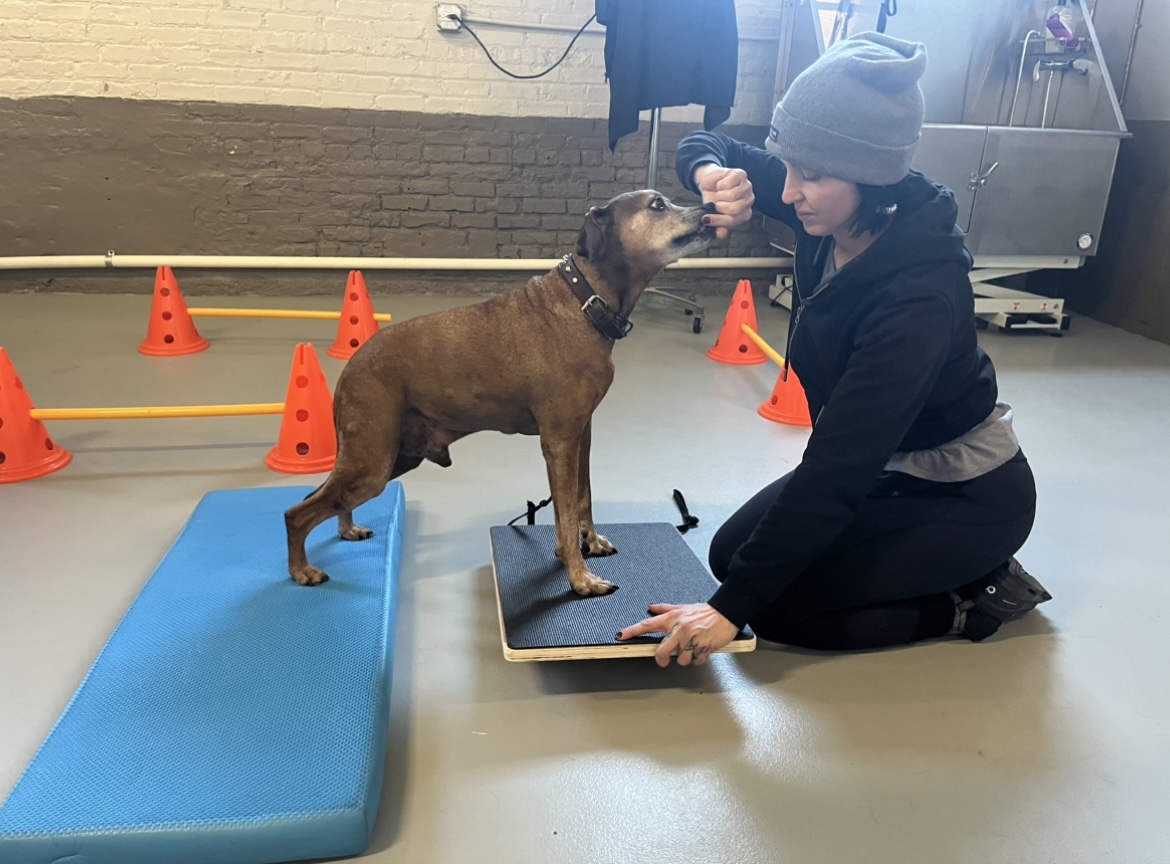
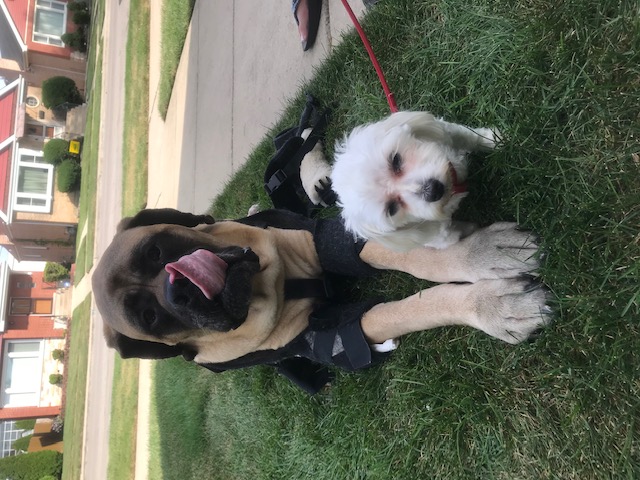
If your pet undergoes surgery for a CCL rupture, it may be one of a few different surgical techniques (extracapsular repair, tibial plateau leveling osteotomy, or tibial tuberosity advancement). Conservative treatment may begin with pain and anti-inflammatory medications and rest.
Immediately post surgically, you and your pet may benefit from a “home help" visit. Home help visits are consultation visits designed to bridge the gap between when your first returns home and when they are ready to begin rehabilitation.
A home help visit can help address questions you may have regarding how to perform range of motion, how to set up your home, and how to help your dog outside for potty breaks. An inflammation reducing cold level laser treatment may also be performed.
Special considerations with conservative care include whether an orthotic or brace would be appropriate depending on the degree of tear and your dog’s pain and functional mobility.
Whether you opt for surgical or conservative treatment for your pet’s CCL disease, rehabilitation is highly recommended to return your pet to optimal function.
A rehabilitation eval can be performed by one of our physical therapists to determine which treatments may be best to augment the medical management already being performed by your vet. Rehabilitation treatments to manage pain and inflammation, improve posture, increase strength, decrease compensations, and increase functional movements will be prescribed to make sure your pet is on the road to enjoying more days with you!
Download your FREE CCL Guide!
Read some of our CCL Care testimonials:
We loved working with Jeanine when our elderly dog tore his ACL. Jeanine is incredibly knowledgeable and compassionate. Our dog loved seeing her every week and she really helped us understand what had happened and how his exercises were addressing his needs. Our dog can be quirky, but Jeanine was always patient and understanding. We wholeheartedly recommend working with Jeanine!
-Lindsay, Low's Mom

We cannot stress enough what a Godsend Jeannine has been to our dog Morgan and her recovery. Morgan is a 10 year old white American bulldog, she’s a big girl with many skin and immunology issues. After Morgan's CCL repair in July we felt that we could not go the conventional clinic rehab route due to covid, her size and unstable condition. it just wasn’t possible for us to hand her off to a clinician for therapy without us being present. We found Jeannine through a client referral and she has been nothing but amazing. She’s incredibly up to date on the latest studies and modalities of therapy, and we were able to complete them all in our home. Jeannie taught us how to help Morgan and how to keep her from doing any further injury to herself while she worked on getting stronger and healing. We never felt rushed or as if we bothered her with our questions or concerns (we had many ) actually Jeannine always messaged during the off days to see how Morgan was doing and to find out if we had questions. Our dog has suffered from chronic illness for the entire 8 years we have had her and because Jeannine truly cares about every aspect of her patients well-being she investigated our pups issues and ultimately referred us to a practitioner that has been able to heal her. After many years of treatments, testing, specialist and suffering, we finally see her living without pain and sickness. We have been blessed to have our dog heal from surgery with Jeanine’s help and we have a much healthier and happier dog because she cared about Morgan’s overall condition. We absolutely recommend Jeannine and LSBS; had we gone the conventional route I know we would not have been as happy or gotten these kinds of results.
-Teri, Morgan's Mom

This is a wonderful service. Jeanine is amazing! She is so patient and kind. My 14 year old beagle tore her CCL while jumping out of the car. Jeanine got her back to running, jumping and hunting in a 40 acre dog park as good as before her injury which I thought would never happen again. The fact that Jeanine comes to the house is so great. Avoids the fear factor my senior dog experiences when going to a medical setting. I think being she is relaxed, she gets so much more out of the sessions. I can't say enough about Little Steps and Jeanine.
-Kathleen, Mattie's Mom

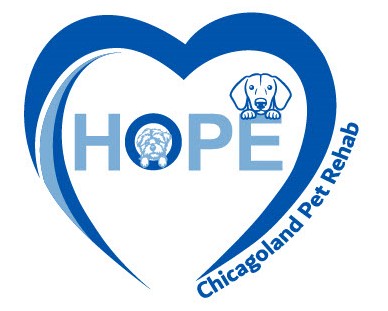
We help animals with mobility impairments and intervertebral disc disease (IVDD) enjoy their favorite activities and routines with you again!
© 2024 Hope Chicagoland Pet Rehab. All Rights Reserved.
